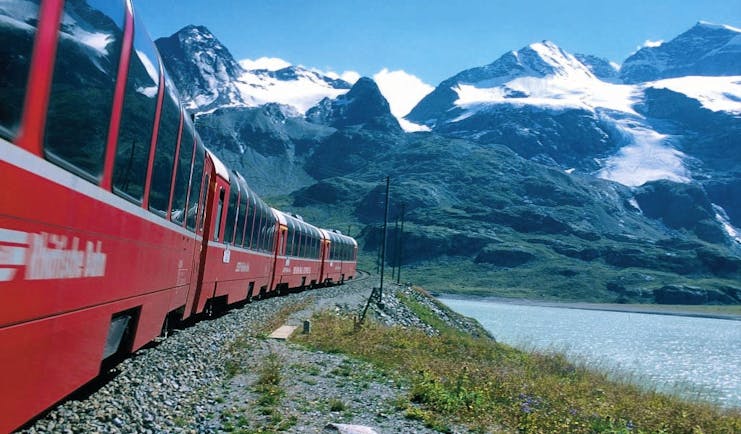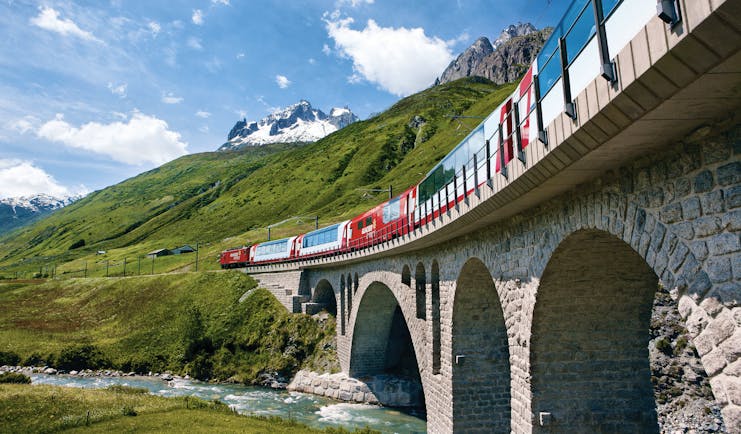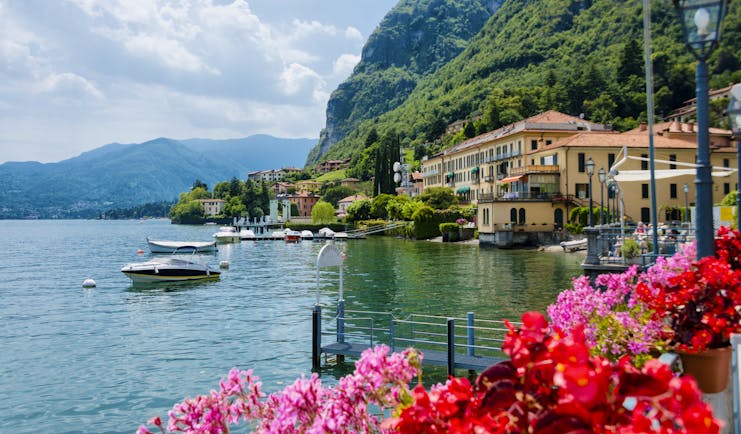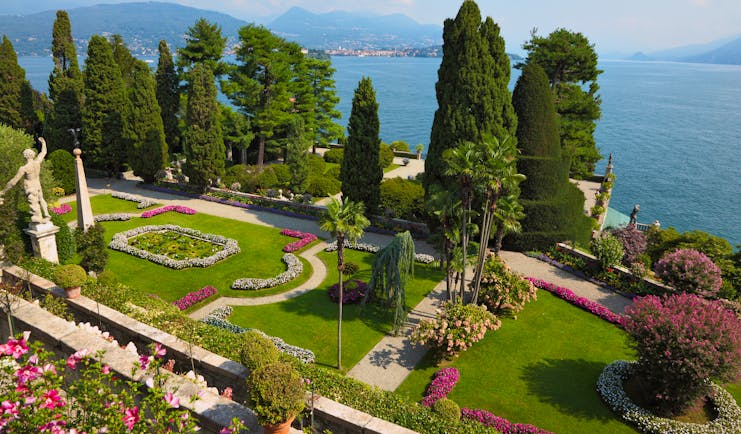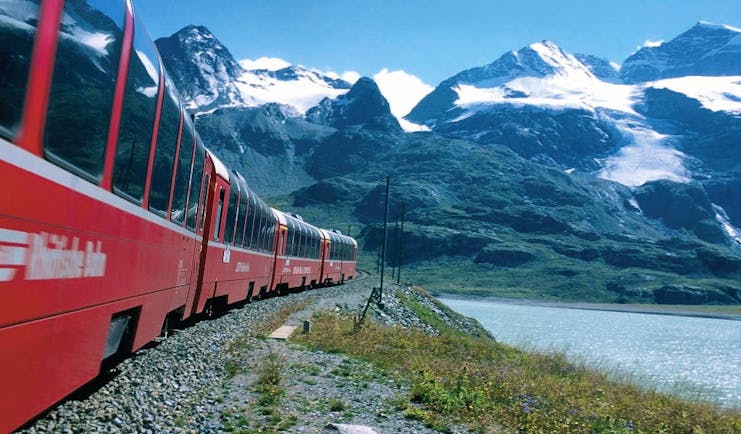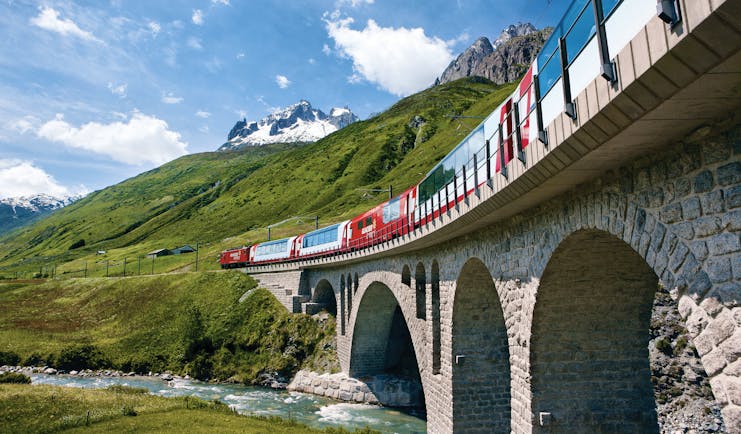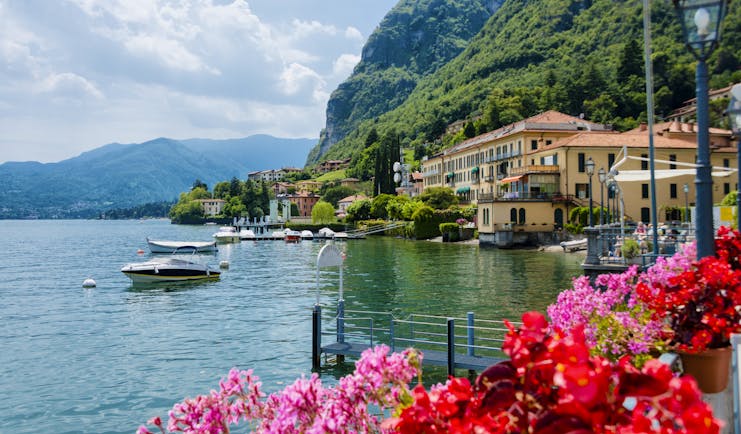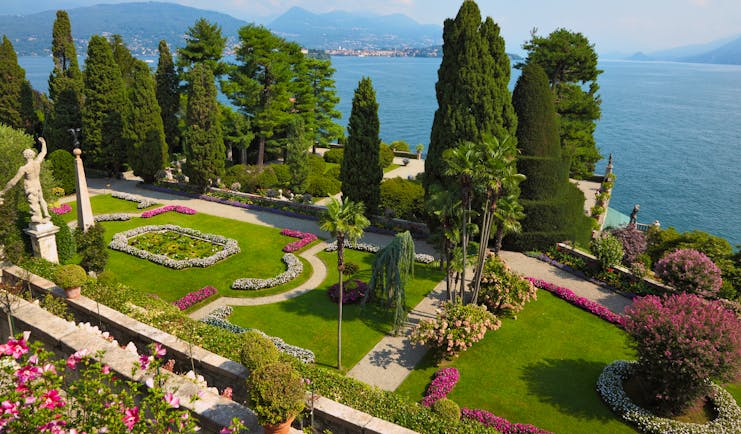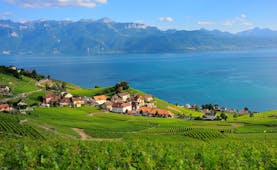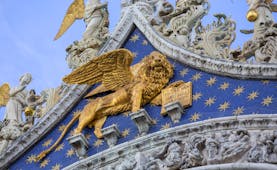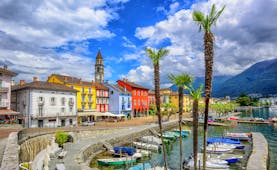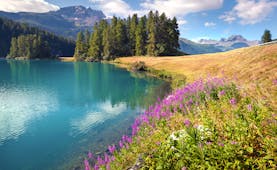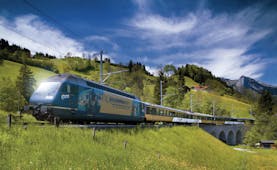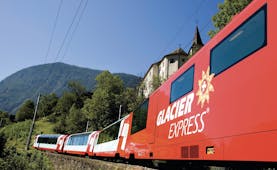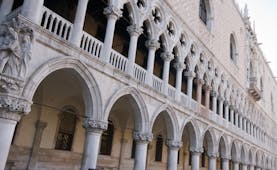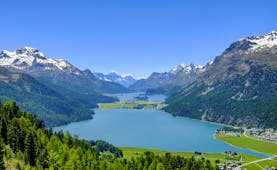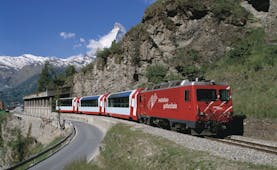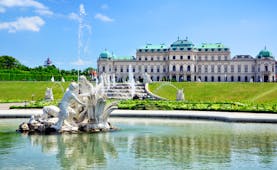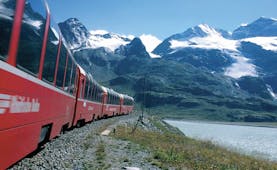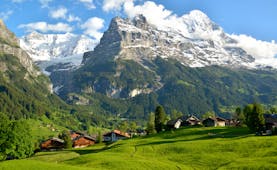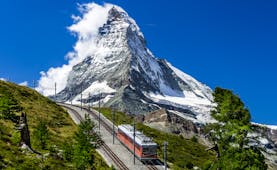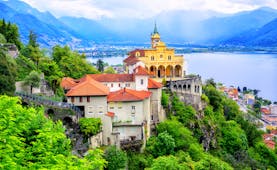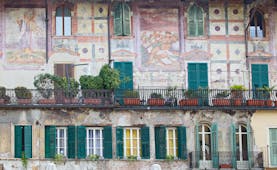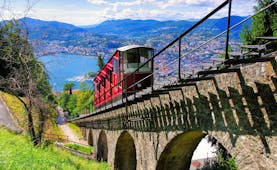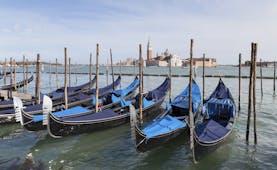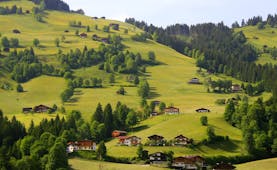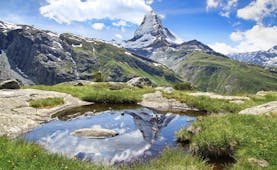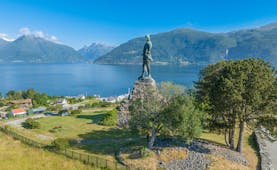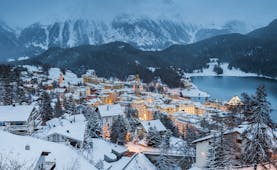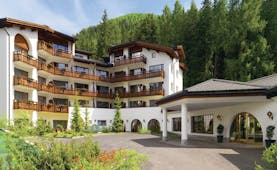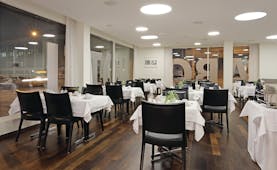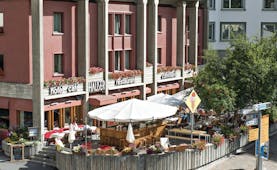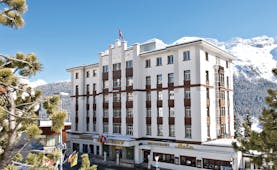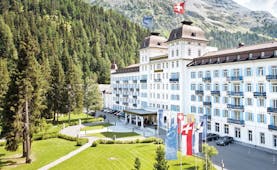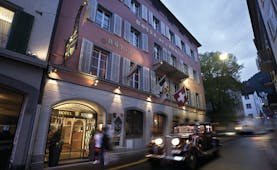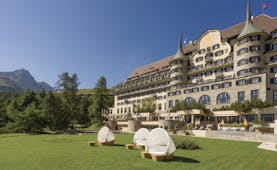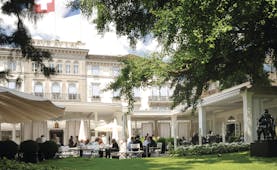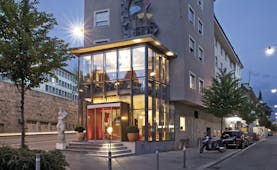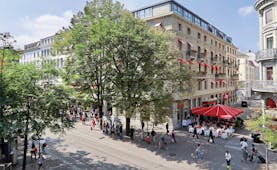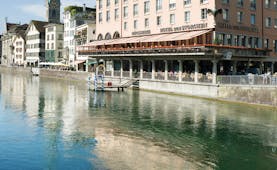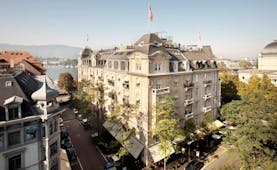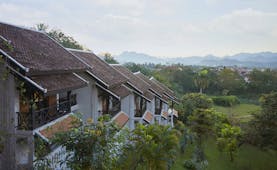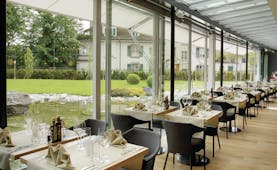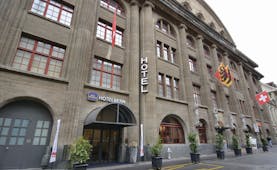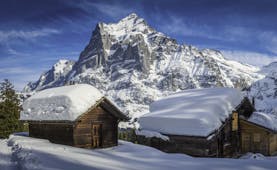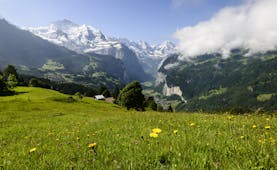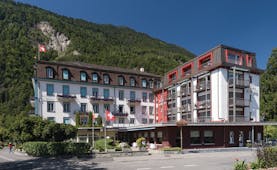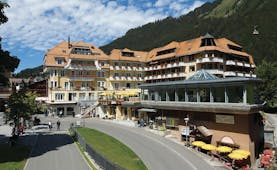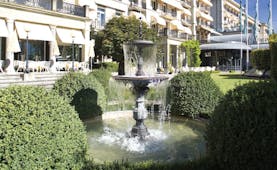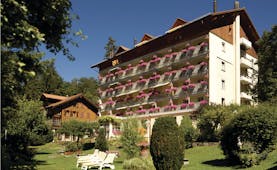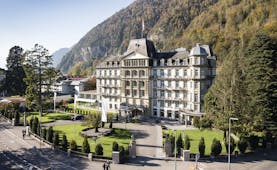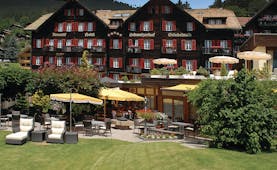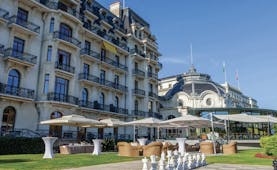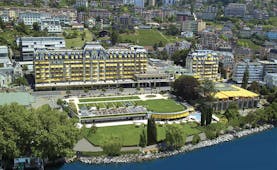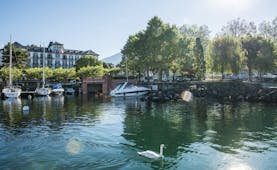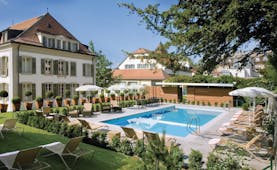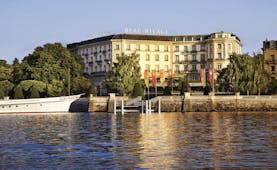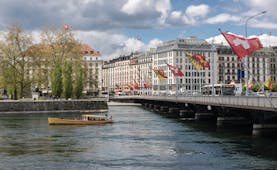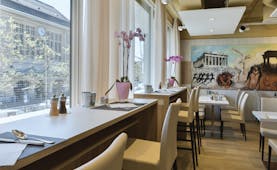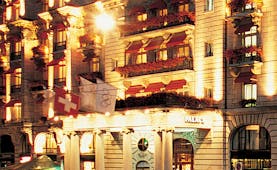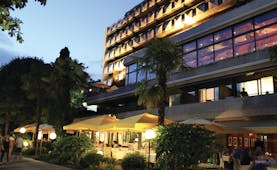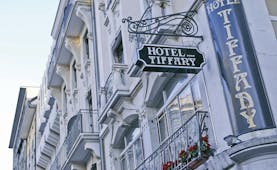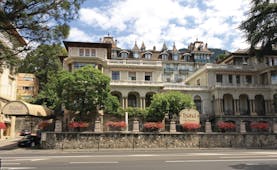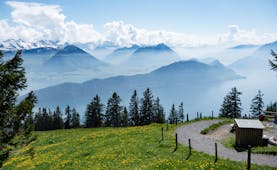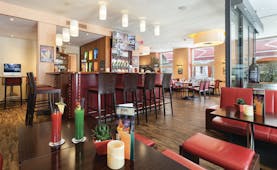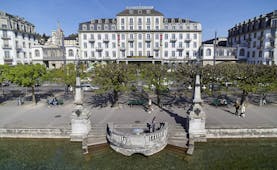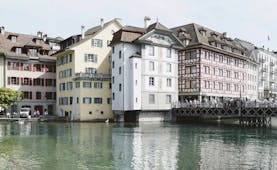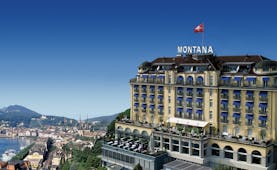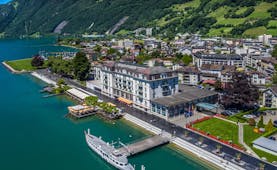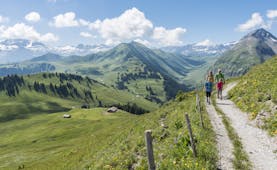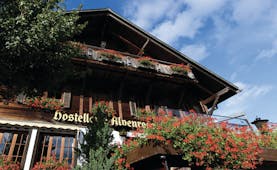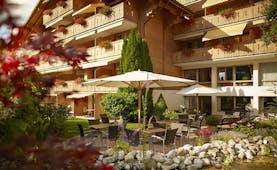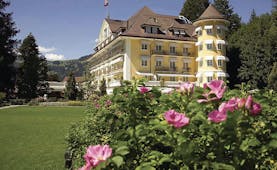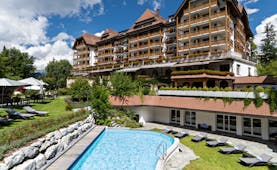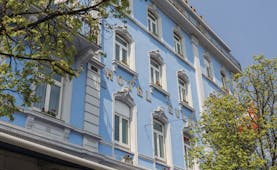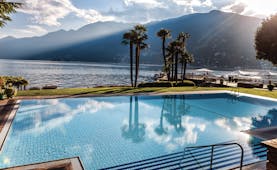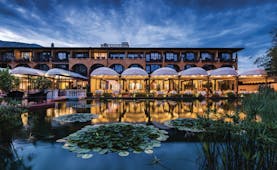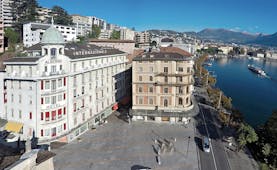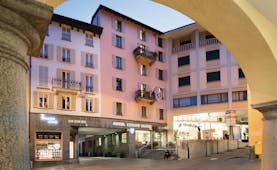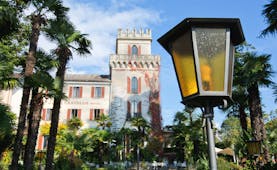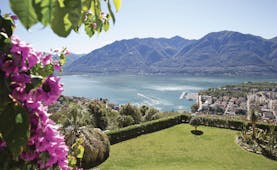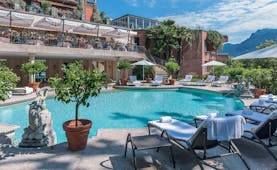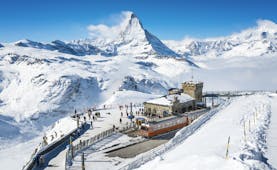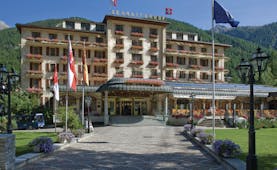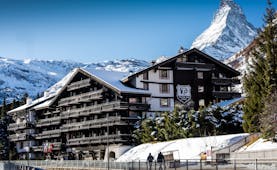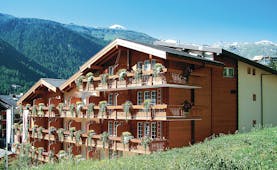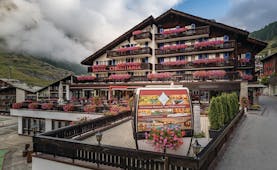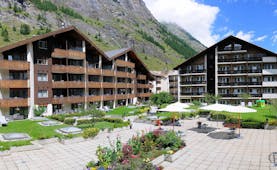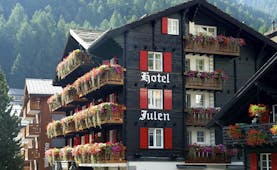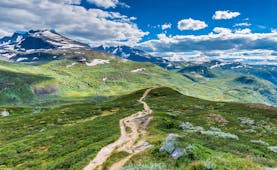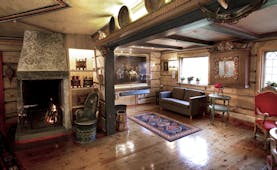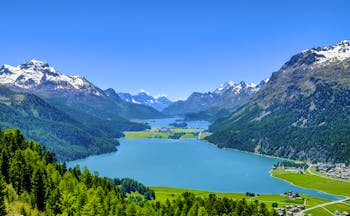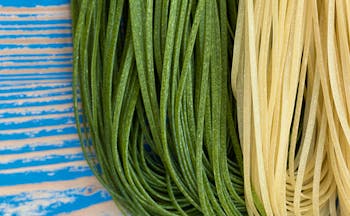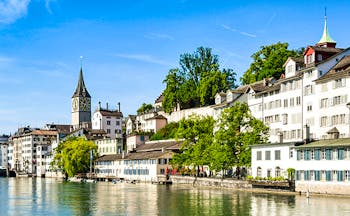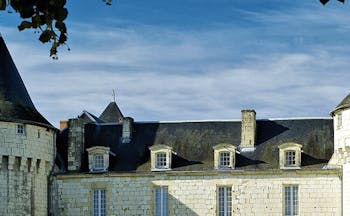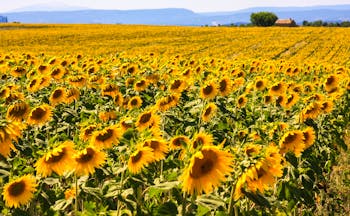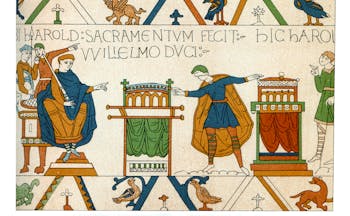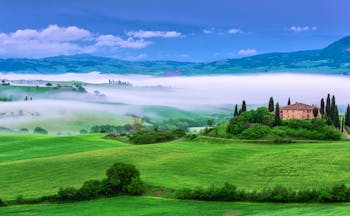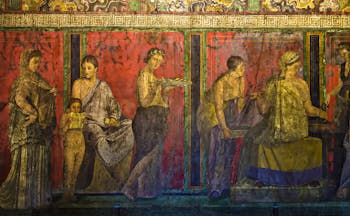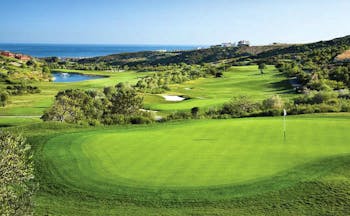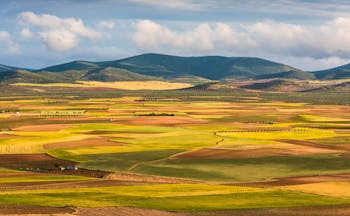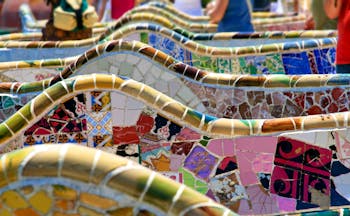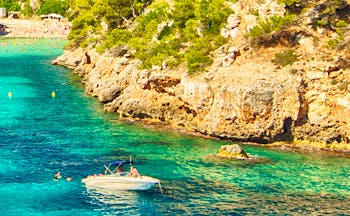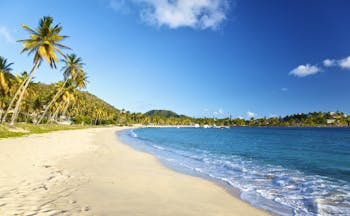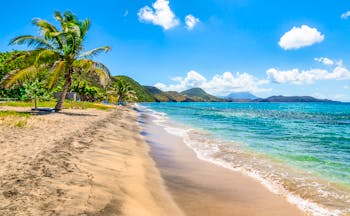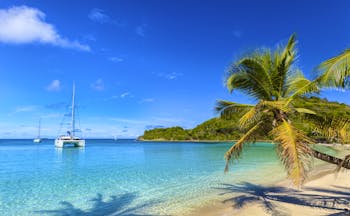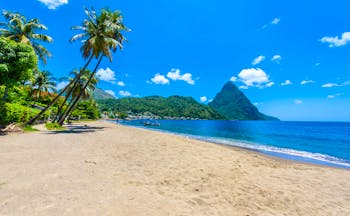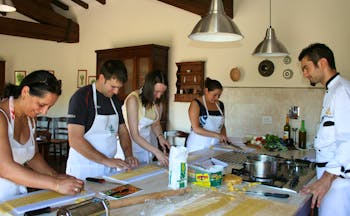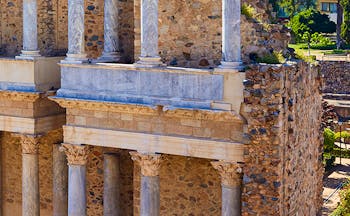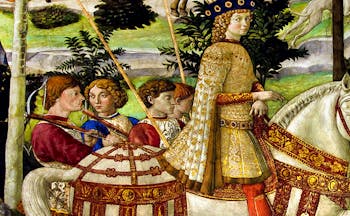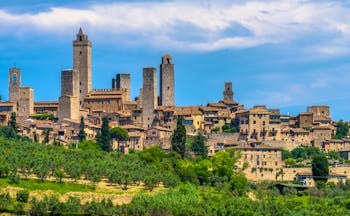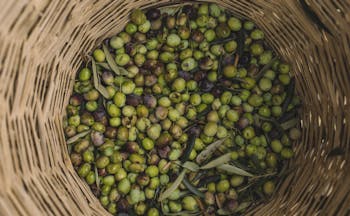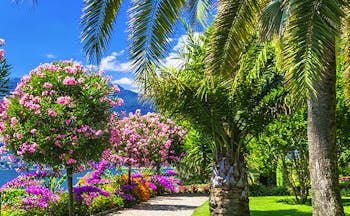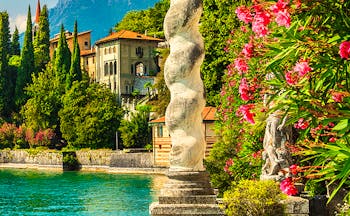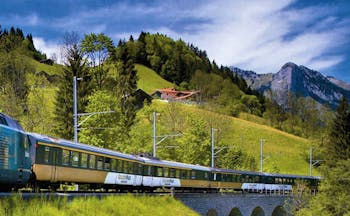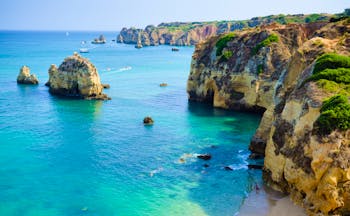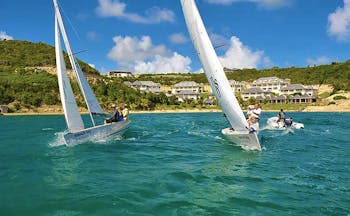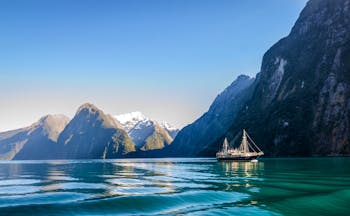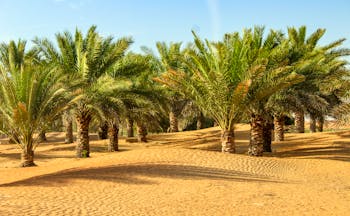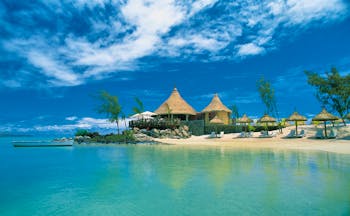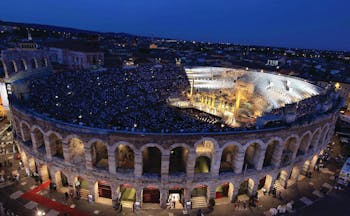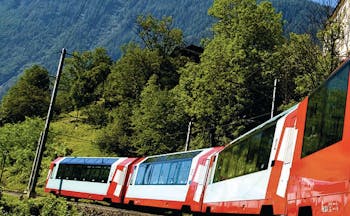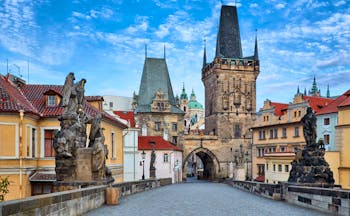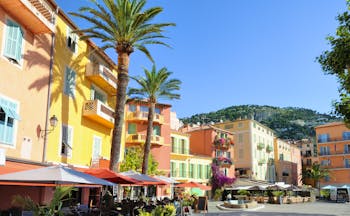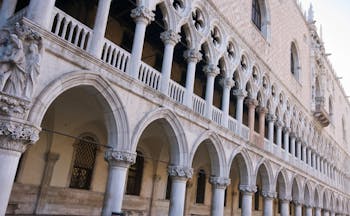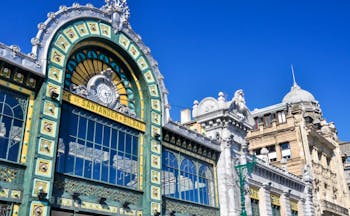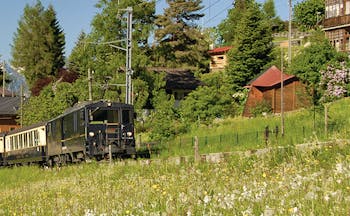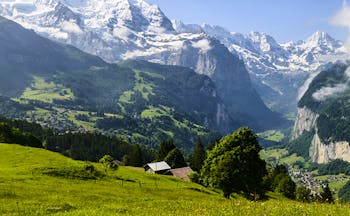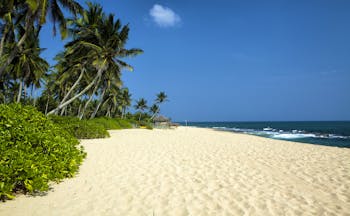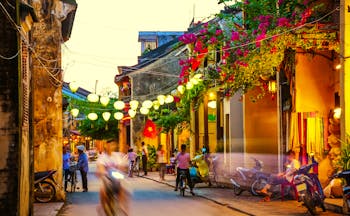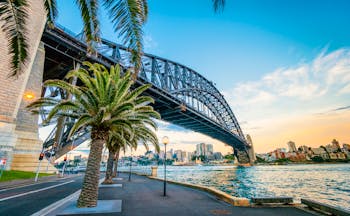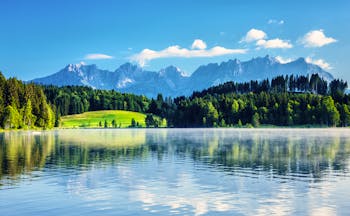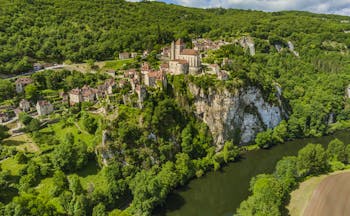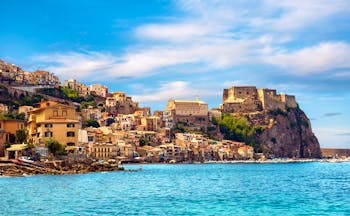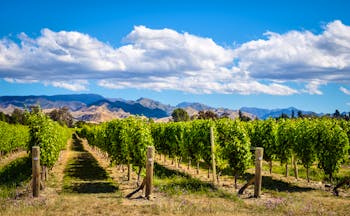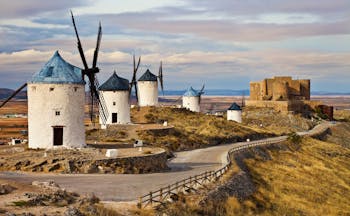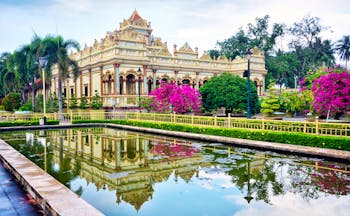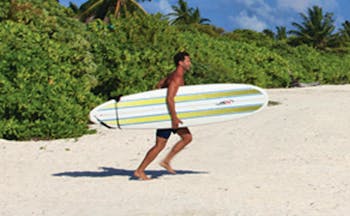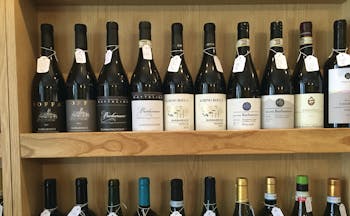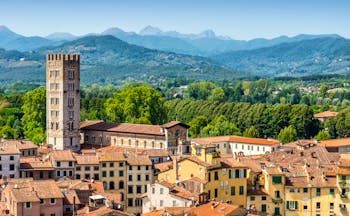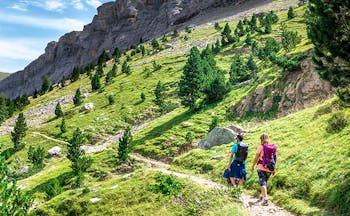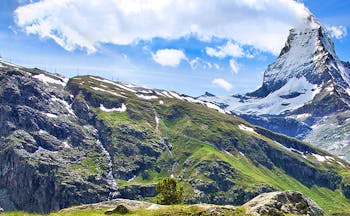Lake Como Italy by Bernina Express luxury rail tailor-made holiday
This 6-night luxury rail holiday to Lake Como on the Italian Lakes by Bernina Express train offers a delightful route through Switzerland to Italy. Stay one night in Zurich and then another night in Chur before joining the iconic scenic train, the Bernina Express, to travel through the very heart of the Swiss Alps.
The four-hour journey on the Bernina Express from Chur to Tirano is truly spectacular. The train travels mostly at low speeds giving time to take in the snow-capped mountains, pine forests, pretty villages and mountain lakes. The line crosses 196 bridges and 55 tunnels. At its highest point at Ospizio Bernina, the route reaches 2,253 metres before dropping 1,800 metres down to Tirano on the Italian border. In Tirano there is time for lunch before taking an onward local train to Lecco on Lake Como. This is an attractive train journey, at first passing vineyards perched precariously on hillside terraces, and then travelling along the eastern edge of Lake Como.
At Lecco, you are met by a private car and driver to take you to your hotel in Bellagio, the prettiest spot on Lake Como. For your return journey there are several options available; you can choose to take a high-speed train from Milan to Paris and arrive back into London late evening on the same day, alternatively, it is possible to return home with a night or more in Switzerland, perhaps in Lausanne on Lake Geneva.
Highlights
Zurich • Chur • Bernina Express • Lake Como • Visit the gardens of Villa Monastero • Visit the gardens of Villa Carlotta at Tremezzo • Visit Villa Melzi d’Eril at Bellagio • Visit the resort of Cadenabbia
Day by day
Your rail holiday to Lake Como and the Bernina Express starts with a journey by Eurostar from London St Pancras to Paris Nord station, leaving at about 7.00 am. On arrival in Paris you change stations to Gare de Lyon where you may be able to have lunch at the famous Train Bleu restaurant. From Paris Lyon, the high-speed TGV service takes you across France and into Switzerland arriving into Zurich at about 4.30pm. Spend one night in Zurich at a suggested hotel not far from the lake and the old town.
Spend this morning sightseeing in this historic and enchanting city, perhaps stopping at the Grossmunster church and climbing the Karlsturm tower. We recommend taking the train to Chur in the afternoon giving you some time to investigate Chur. Chur is Switzerland’s oldest city and acts as the gateway for the Bernina Express railway. Twisting streets, historic buildings, restaurants, bars, museums, galleries, boutiques, and a pedestrianised old town provide plenty of cultural entertainment to fill your time here.
Return to the train station to meet the iconic Bernina Express at 8.30am for the stunning four-hour journey through the Alps to Tirano. Notice the sheer white cliffs, hilltop towers, and gorges of the Ruinaulta as you traverse the area around the pretty ochre village of Tiefencastel. The train now sweeps back round to Filisur, passing through the railway towns of Bergun, Samedan and Celerina. The Bernina Express then takes you around the Montebello Curve, the most photographed section of the journey, which prolongs the breath-taking views of the Morteratsch Glacier. From here, gain altitude until you reach the highest point on the Rhaetian Railway at Ospizio Bernina at 2253m above sea level, with its picturesque, isolated station house. The Bernina Express then takes you to a restaurant that can only be accessed by train, past the grand houses of Poschiavo, through idyllic villages, across a spiralling viaduct, to Tirano, surrounded by vineyards and orchards in Italy. Upon arrival in Tirano you will have time for lunch in one of a number of restaurants and cafes near the station. Then, continue by train to Lake Como. Final transfer arrangements will vary according to your destination on Lake Como.
You have three days on Lake Como for rest and exploration. Lake Como is outstandingly beautiful, narrow and long, with luxuriant vegetation of olives, figs, mulberries, walnuts and oleanders, and is lined with cheerful resorts, splendid villas and mountainous backdrops. The architecture is quite rustic and alpine in feel, yet a sophisticated aura radiates throughout the area. Often called the prettiest town in Europe, Bellagio sits on a promontory dividing the subsidiary Lake Lecco from the southern part of Lake Como. The enchanting village is full of quaint cafes and boutiques, which line its little streets and alleyways ascending from the main square. In Bellagio visit Villa Melzi d’Eril, once a favourite picnic spot of the great composer, Franz Liszt, the gardens of this aristocratic villa are unsurpassable in their beauty and location. Although the 19th century villa is not open to the public, you can access the opulent Empire-style family chapel. Across a narrow finger of the lake from Bellagio, is the town of Varenna, bursting with gardens and cypresses. Its main attraction is the gardens of Villa Monastero. At Tremezzo another famous villa, well worth visiting, is that of Villa Carlotta. This villa was built by the extravagant marquis Giorgio Clerici between 1690 and 1743. The magnificent interior houses an enviable collection of Antonio Canova sculptures including Cupid and Psyche. The gardens are the real highlight though: 14 acres of rhododendrons, azaleas, palms, banana trees orchids, camellias and even a sequoia blossom and flourish amongst many other species, totalling 500 in all! A pretty resort on the lake and the starting point for many excellent walks up into the hills behind the lake is Cadenabbia, as is its neighbour, Menaggio. The largest town on the lake, and one that is often overlooked, is Como. Como is an attractive cathedral town, made up of cobbled streets and chic cafes of the old town and the newer industrial area famous for its fine silk production. You can visit silk producers and their shops. The cathedral was completed during the Renaissance period, and now boasts a striking façade and interior of both the Gothic and Renaissance styles. The façade includes statues of two of Como’s most famous residents, Pliny the Elder and Pliny the Younger, whose writings played a key role in the development of antique thought and philosophy. You don’t need the use of a hire-car when you are on Lake Como, but we can arrange one for you.
Today there is a very early departure from your hotel by private car to reach Milan Porta Garibaldi for the direct day-time service to Paris Gare de Lyon. You make your way to the Gare du Nord for a Eurostar that reaches London in the early evening. If you prefer, and to avoid a very early start, we can arrange for you to travel from Lake Como back through Switzerland to spend a night there again before heading back to Paris and London the next day.
We felt the views on the Bernina Express were the highlight of the entire trip. We will be sure to use your services again in the future.Mr C, May 2019
Holiday price guide From £2,630 per person based on two people sharing a double room in a 4-star hotel and including for second class rail travel, or from £3,630 in a 5-star hotel. First class supplement £520 per person.
Holiday Code ITBR05
Call us on 01392 441245
Lake Como Italy by Bernina Express luxury rail tailor-made holiday
Your rail holiday to Lake Como and the Bernina Express starts with a journey by Eurostar from London St Pancras to Paris Nord station, leaving at about 7.00 am. On arrival in Paris you change stations to Gare de Lyon where you may be able to have lunch at the famous Train Bleu restaurant. From Paris Lyon, the high-speed TGV service takes you across France and into Switzerland arriving into Zurich at about 4.30pm. Spend one night in Zurich at a suggested hotel not far from the lake and the old town.
Spend this morning sightseeing in this historic and enchanting city, perhaps stopping at the Grossmunster church and climbing the Karlsturm tower. We recommend taking the train to Chur in the afternoon giving you some time to investigate Chur. Chur is Switzerland’s oldest city and acts as the gateway for the Bernina Express railway. Twisting streets, historic buildings, restaurants, bars, museums, galleries, boutiques, and a pedestrianised old town provide plenty of cultural entertainment to fill your time here.
Return to the train station to meet the iconic Bernina Express at 8.30am for the stunning four-hour journey through the Alps to Tirano. Notice the sheer white cliffs, hilltop towers, and gorges of the Ruinaulta as you traverse the area around the pretty ochre village of Tiefencastel. The train now sweeps back round to Filisur, passing through the railway towns of Bergun, Samedan and Celerina. The Bernina Express then takes you around the Montebello Curve, the most photographed section of the journey, which prolongs the breath-taking views of the Morteratsch Glacier. From here, gain altitude until you reach the highest point on the Rhaetian Railway at Ospizio Bernina at 2253m above sea level, with its picturesque, isolated station house. The Bernina Express then takes you to a restaurant that can only be accessed by train, past the grand houses of Poschiavo, through idyllic villages, across a spiralling viaduct, to Tirano, surrounded by vineyards and orchards in Italy. Upon arrival in Tirano you will have time for lunch in one of a number of restaurants and cafes near the station. Then, continue by train to Lake Como. Final transfer arrangements will vary according to your destination on Lake Como.
You have three days on Lake Como for rest and exploration. Lake Como is outstandingly beautiful, narrow and long, with luxuriant vegetation of olives, figs, mulberries, walnuts and oleanders, and is lined with cheerful resorts, splendid villas and mountainous backdrops. The architecture is quite rustic and alpine in feel, yet a sophisticated aura radiates throughout the area. Often called the prettiest town in Europe, Bellagio sits on a promontory dividing the subsidiary Lake Lecco from the southern part of Lake Como. The enchanting village is full of quaint cafes and boutiques, which line its little streets and alleyways ascending from the main square. In Bellagio visit Villa Melzi d’Eril, once a favourite picnic spot of the great composer, Franz Liszt, the gardens of this aristocratic villa are unsurpassable in their beauty and location. Although the 19th century villa is not open to the public, you can access the opulent Empire-style family chapel. Across a narrow finger of the lake from Bellagio, is the town of Varenna, bursting with gardens and cypresses. Its main attraction is the gardens of Villa Monastero. At Tremezzo another famous villa, well worth visiting, is that of Villa Carlotta. This villa was built by the extravagant marquis Giorgio Clerici between 1690 and 1743. The magnificent interior houses an enviable collection of Antonio Canova sculptures including Cupid and Psyche. The gardens are the real highlight though: 14 acres of rhododendrons, azaleas, palms, banana trees orchids, camellias and even a sequoia blossom and flourish amongst many other species, totalling 500 in all! A pretty resort on the lake and the starting point for many excellent walks up into the hills behind the lake is Cadenabbia, as is its neighbour, Menaggio. The largest town on the lake, and one that is often overlooked, is Como. Como is an attractive cathedral town, made up of cobbled streets and chic cafes of the old town and the newer industrial area famous for its fine silk production. You can visit silk producers and their shops. The cathedral was completed during the Renaissance period, and now boasts a striking façade and interior of both the Gothic and Renaissance styles. The façade includes statues of two of Como’s most famous residents, Pliny the Elder and Pliny the Younger, whose writings played a key role in the development of antique thought and philosophy. You don’t need the use of a hire-car when you are on Lake Como, but we can arrange one for you.
Today there is a very early departure from your hotel by private car to reach Milan Porta Garibaldi for the direct day-time service to Paris Gare de Lyon. You make your way to the Gare du Nord for a Eurostar that reaches London in the early evening. If you prefer, and to avoid a very early start, we can arrange for you to travel from Lake Como back through Switzerland to spend a night there again before heading back to Paris and London the next day.
We felt the views on the Bernina Express were the highlight of the entire trip. We will be sure to use your services again in the future.Mr C, May 2019
Holiday price guide From £2,630 per person based on two people sharing a double room in a 4-star hotel and including for second class rail travel, or from £3,630 in a 5-star hotel. First class supplement £520 per person.
Holiday Code ITBR05
Our prices include
● Second-class travel on all trains, with standard class on Eurostar (first and standard premier can be booked at a supplement)
● Chur to Tirano on the Bernina Express, second-class included
● Private car transfers from Lecco station to your hotel, and from your hotel to Milan station
● 1 night’s bed and breakfast in a Classic room at the Hotel St Gotthard, Zurich
● 1 night’s bed and breakfast in a Standard room at the Romantik Hotel Stern, Chur
● 4 nights’ bed and breakfast in a Deluxe lake view room at 5-star Grand Hotel Villa Serbelloni, or in a Park view room at the 4-star Grand Hotel Imperiale or in a Lake view room at the 3-star Hotel du Lac, Bellagio
● Concierge service and Expressions Holidays regional helpful hints
Our prices do not include
● Early check-in or late check-out at any hotels (although we can arrange this on request at additional cost)
● Any other services not mentioned above, such as transfers and meals except breakfast at hotels
● Personal holiday insurance. This is essential and cover should be in place from when you book the holiday.
● Local tourist tax, usually between Euros 1 and 3 per person per night, and payable locally to the hotel
● Transfers in Paris
Call us on 01392 441245
Lake Como Italy by Bernina Express luxury rail tailor-made holiday
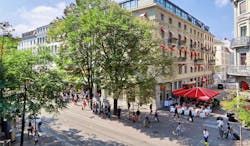
Hotel St Gotthard is a sophisticated 4-star hotel in an excellent central location. Haute cuisine and stylish, comfortable accommodation make this an excellent spot to recuperate after enjoying the cultural delights of Zurich.
Comfort room
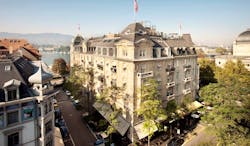
The Romantik Hotel Europe in Zurich is a charming, boutique, family-run hotel with 39 rooms just two minutes’ walk from the shores of Lake Zurich and by the Opera House.
Classic room
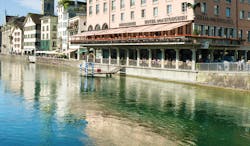
Hotel Storchen is an elegant and refined 5-star boutique hotel in a beautiful waterfront location. Delicious cuisine and luxurious accommodation make this an excellent spot to recuperate after enjoying the cultural and historical delights of Zurich.
Classic room
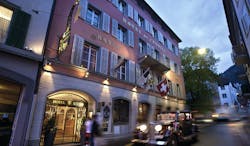
Hotel Stern is a 4-star hotel offering both Swiss authentic style and modern comforts in the historic town of Chur. Supremely comfortable accommodation and a traditional, rustic restaurant afford guests a relaxing and restorative experience.
Standard room
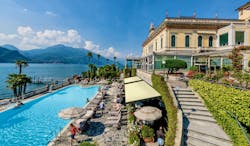
Grand Hotel Villa Serbelloni is a 5-star deluxe hotel in a beautiful lakeside location. The excellent spa facilities, gourmet cuisine and stunning gardens afford guests a truly tranquil and indulgent experience.
Deluxe lake view room
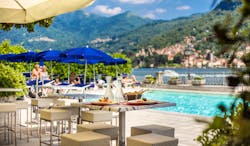
Grand Hotel Imperiale Resort & SPA offers period Art Nouveau grandeur in a splendid lakeside setting. This hotel offers the chance to experience both the peaceful beauty of Lake Como and a taste of Italian town life.
Park view room
We felt the views on the Bernina Express were the highlight of the entire trip. We will be sure to use your services again in the future.Mr C, May 2019
Holiday price guide From £2,630 per person based on two people sharing a double room in a 4-star hotel and including for second class rail travel, or from £3,630 in a 5-star hotel. First class supplement £520 per person.
Holiday Code ITBR05
Call us on 01392 441245
Lake Como Italy by Bernina Express luxury rail tailor-made holiday
About Italy
Luxury holidays to Italy are all about the appreciation of things Italian: the way of life, the culture, the art, the design, the landscape, the food and the wine. The Italian countryside exudes a classical harmony that is all but imprinted in the Western psyche, while the charm and humour of the Italian people creates an endearing sense of well-being.
Facts in brief
Capital RomeAirport There are many international airports in Italy, with the main ones being Venice, Pisa, Milan Malpensa, Rome Fiumicino, Bologna, Naples, Genoa, Turin and Bari; on Sicily, Catania and Palermo are served by airlines from the UK and on Sardinia you fly to Cagliari or Olbia.
Size Italy is roughly 650 miles long, but only about 100 miles wide
Population 60 million
Call us on 01392 441245
Lake Como Italy by Bernina Express luxury rail tailor-made holiday
About Grisons and the Engadine
Dotted with National Parks, Grisons and the Engadine are best known for the dramatic Alpine scenery and the major winter sports resorts; yet, in the spring, summer, and autumn months, the region has far more to offer. Historic towns, scenic lakes and glaciers, and chic villages packed with gourmet restaurants and boutique shops come into their own in the sunshine. The Ela Park, through which the world-famous Glacier Express and Bernina Express run, stretches between Chur and St Moritz. Passing through here by car or rail will introduce you to miles-upon-miles of quintessentially Swiss landscape: lush, natural fields are interspersed with evergreen forests, clusters of rustic wooden houses, and jagged mountain peaks such as the Lenzerhorn, Piz Vadret, Piz Platta, as well as Piz Bernina in the distance. Visitors to this region in the summer have these sublime panoramas as their object. The Engadine is known for its sporting possibilities. Hiking and walking trails take you up to the most sought-after and secluded vantage points, and the extensive network of cycling paths offer endless destinations; one route even leads to Budapest.
Highlights of Grisons and the Engadine
Between the peaks, valleys, and lakes of Grisons and the Engadine, towns and villages with hidden cultural treasures abound. Some of the oldest settlements in Switzerland are located here, still with the same medieval atmosphere. One of the most iconic images associated with Grisons is Tarasp Castle, built in the 11th century, perched on its hundred-metre-high rock in the centre of its surrounding valley. To see more of traditional Engadine style, visit the ancient villages of Guarda, Ftan, and Sent. The village of Zernez is known as the ‘Gateway to the Swiss National Park,' which also extends south into Italy. The Inn Valley is the perfect place to admire your surroundings. 60km of hiking trails wind their way across the landscape between Maloja and Scuol, believed to be the most rewarding trails in Switzerland because of the high-altitude views. Between the months of May and September, the Inn Valley gorges are ideal for rafting, as their calm turquoise waters bustle white. The Bains Engadine in Scuol were the first Roman-Irish baths in Switzerland, now providing saunas and pools with a very impressive backdrop.
Cultural highlights of Grisons and the Engadine
The three main towns of interest are Chur, Davos, and St Moritz. Chur is the oldest city in Switzerland, affectionately named the ‘Alpine City.’ Twisting streets and historic buildings, restaurants, bars, museums, galleries, boutiques, and a pedestrianised Old Town mean the city is abounding in charming character. A farmer's market is held in the main square of the Old Town every Saturday morning between the months of May and October. High above the town stands the Bishop's Palace. Fortified walls surround the central courtyard, which holds the Cathedral of the Assumption, dating back over 800 years. Chur is also home to the region's three largest museums. Explore its history in the Rhaetian Museum, the works of prestigious local artists at the Museum of Fine Art, and the flora, wildlife, and geological history at the Graubunden Natural History Museum. The two most popular mountain peaks in the area around Chur are the Branbruesch and the Dreibundenstein, both accessible by cable car and hiking routes. Chur has the highest concentration of restaurants and bars in Switzerland, making it an excellent destination for gastronomists and those who enjoy sampling a range of delicacies in a new restaurant each night. The highest ‘town’ in the Alps, at 1560m above sea level, is Davos, another popular destination with winter sports enthusiasts. In the summer, however, the snow melts to reveal over 700km of hiking paths. These can be accessed via cable cars up to the Jakobshorn (2590m), the Weissflujoch (2844m), and the Rinerhorn (2490m). Horse-drawn carriages take you along the narrower valleys of Sertig, Dischma, and Fluela. At Davos Lake, visitors can take a refreshing swim or enjoy the sports available at the sailing and surfing area. Alternatively, visit the Zugenschlucht gorge to follow the geology trail, the rocky path of the river, or to visit the mining museum. For something even more unusual, spend an hour at the Monstein Brewery, the highest brewery in Europe, and the first in Switzerland to be opened for tastings and tours. St Moritz is perhaps the best-loved Alpine winter destination in Switzerland, and possibly Europe. At 1822m above sea level, visitors are welcomed first by views across the Upper Engadine Valley. The local peaks, including the Piz Corvatsch, Chantarella, and Corviglia can be reached via mountainside railway, and from Corviglia, you can take a cable car up to Suvretta's most famous viewing point. Though St Moritz is not a waterside village, the nearby Lake Sils and Lake Silvaplana are perfect for water sports, particularly the latter, which is known for being windy. The village of St Moritz itself is smattered with quaint cafes and stunning buildings with peaked roofs, and the central churches provide beautiful destinations after a morning of exploration on foot. Just outside St Moritz is Celerina, home to the Cresta Run, one of the area's most famous attributes. Celerina is also the first stop on the Glacier Express route from St Moritz to Zermatt: a journey of viaducts, steep inclines, spiralling declines, and some of Switzerland's most famous mountains.
Festivals in Grisons and the Engadine
In Switzerland there is only one nationally celebrated day, the Anniversary of the Founding of the Swiss Confederation on the 1st August, aside from Christmas, advent and New Year. Apart from these, festivals and holidays are determined by the canton and the town. The residents of Grisons see in the first day of March with Chalanda Marz, in which bells are rung to chase out the winter. In Disentis on July 11th, a religious procession takes place to honour Saint Placidus. In Pontresina, St Moritz, and across the canton, the BSI Engadine Festival brings the region to life with performances of classical music in August. The most unusual of the major festivals in Grisons and the Engadine may well be in Chur, at the Chur City Festival and Alpine Beard Festival in August. In the autumn, Chur Theatre performs a diverse international theatre and dance programme, and in August every two years open-air opera is performed at the Haldenstein Castle.
Gastronomy in Grisons and the Engadine
As Grisons is still comprised of three language areas (Italian, German, and Romansh), the cuisine remains eclectic and varied. Many ingredients, prominent in the Alpine terrain are recombined in new ways to create different, flavoursome dishes. Three popular dishes in particular are maluns, capuns, and pizokels. Maluns are made from boiled potatoes, which are then grated, rolled in flour, and then roasted in butter. Often eaten by farmers for breakfast, maluns are also popular snacks to accompany a cup of coffee or served with Alpine cheese at dinner. Capuns come in a range of varieties, but are always wrapped in savoy cabbage leaves, spinach leaves, or Swiss chard. Inside, they have some combination of dough, meat, fish, and vegetables. Pizokels are baked dishes of special dough and vegetables topped with cheese.
Call us on 01392 441245
Lake Como Italy by Bernina Express luxury rail tailor-made holiday
About Zurich
Zurich is a city that adapts to and flourishes in every season. In the summer, it is a cosmopolitan haven of designer boutiques, riverside pavement cafes, 50 museums, and over 100 galleries; and, in the winter, the streets of grand townhouses, churches, and palaces are transformed into a veritable winter wonderland. Step outside the city and you are immediately cast back into rural, Alpine Switzerland as the landscape becomes more dramatic and Lake Zurich dominates the plethora of natural interest sites. Towns such as Winterthur and Uster are home to their own range of traditions and their own character, with architecture and cuisine that reflects both the proximity of the German border and a proud Swiss national identity. With such close proximity to Zurich airport and the major railway lines, Zurich is an excellent first or last stop on a touring holiday.
Highlights of Zurich
The capital of the German-speaking canton of Zurich is the internationally-renowned historic city of Zurich. The perfect place to acclimatise to the Swiss way of life, there is much cultural discovery to be done. Perhaps begin with the waters of Lake Zurich and the River Limmat, taking a scenic boat cruise, or hiring a dingy for a more hands-on approach. Pedal boats offer a happy medium, and the lakefront Badi-Bars are beautifully situated for an evening drink afterwards. To witness the beauty of the city from above, climb to the top of the Karlsturm, one of the Grossmunster Church's two iconic towers. On the banks of the River Limmat is Schipfe, Zurich's oldest district. It was once the headquarters of the silk industry, and home to many tranquil bathhouses and the workshops of boat-builders; now, however, it has a very serene atmosphere that attracts artisans as well as visitors looking for peaceful strolls down quaint streets. The Lindenhof District was the site of a Roman fort in the 4th century, and Charlemagne's grandson's palace in the 9th century. Today, it is a popular meeting place for Zurich's residents. For a sweeping view of Zurich's Old Town, walk along the promenade in the Niederdorf District. Here, shops are hidden down narrow alleyways, old-fashioned grocery stores sell the local produce, and the views of grand stone buildings are topped off by the Grossmunster's towers. Everywhere in Zurich, however, there are pockets of outstanding beauty, be it beside the 1,200 fountains of drinkable water, on the historic Little Red Train, or Polybahn, that takes you up to the Polyterrasse, or on the world's most luxurious shopping mile, the Bahnhofstrasse.
Cultural highlights of Zurich
Informative cultural experiences can be had at a number of locations around the city. The Kunsthaus Art Museum exhibits a range of permanent and temporary displays by artists of international and local acclaim. The Museum Rietberg exhibits a range of non-European artistic and cult objects. The Arthouse Cinemas are known throughout Europe for the rare opportunity they provide to view independent films in a cinema setting. For innovative modern art, visit the Migros Museum or the Kunsthalle at Lauenbrau-Areal. More unique artistic ventures can be found at the Bruno Weber Park and Cabaret Voltaire, the birthplace of Dadaism. The so-called ‘Home Mountain,' or Uetliberg, is beautifully quilted in rich, dense forest and looks out across the city rooftops below and the blue waters of Lake Zurich. The Uetliberg Railway takes you up to the top of the mountain in no time at all, or it is possible to walk to the summit in less than two hours. Venturing outside the city, you may want to spend a day enjoying the natural scenery. At Rapperswil on Lake Zurich you can step out to the lake's centre to take in the 360 degree panoramic views. Also only a short distance away by rail is the majestic Rhine Falls, the largest plain waterfall in Europe. Stretching 150m across, the sight of the tumbling, crashing water is fantastic and well-worth the train ride. Kyburg Castle, once the home of the Counts of Kyburg and then the Habsburgs, is a magnificent and eerie insight into medieval life, torture, food, and the illustrious heritage of the area. An unseal, irregular pentagon, the castle fits perfectly onto the small hill on which it sits, cradling a picturesque courtyard. At night, the stone walls and square-pyramidal roofs are atmospherically lit from the ground with golden light. The museum housed within introduces visitors to everything medieval, from military fashion to the produce of the authentic vegetable garden. The city of Winterthur, though considerably smaller than Zurich, will be a highlight of your trip. Besides its 17 museums, including the Oskar Reinhart ‘Am Romerholz’ collection of 14th to 20th century art, Winterthur has the largest pedestrianised Old Town in Switzerland. Mansions line the petite squares, and the City Church with its red-topped towers and the Fisher Maiden's Fountain give it exceptional character. The Town Hall Passage remains a famous and popular attraction. Winterthur is also home to a prestigious Centre for Photography, a Casino Theatre, and the Swiss Science Centre Technorama. To end your day in Winterthur, or your stay in the Zurich Region, locate your favourite of the garden city's parks to sit back and enjoy the late afternoon sun.
Festivals in Zurich
In Zurich, the festivals and cultural events generally celebrate modern, artistic accomplishments, spotlighting international, not just local, stars. The Zurich Film Festival, for example, runs from the 22 September to the 2 October, and the Zurcher Theater Spektakel runs from August 13 to September 4. Winterthur plays host to the International Short Film Festival, the Winterthurer Musikfestwochen, and the Afro-Pfingsten. One alternative festival is the Dorflifascht in the Niededorf District at the end of August, when music, markets, food stalls, and shows take over the streets and squares. The Food Zurich festival will be held annually at the end of September, as of 2016, featuring fine, gourmet food sold at stalls by local restaurants and producers. Each year, the Manifesta takes on popular cultural and political issues, and deals with them through art over a period of up to 100 days.
Gastronomy in Zurich
The cuisine in Zurich is very typically Swiss, meaning that trying the chocolate, particularly by Lindt, Laderach, and Vollenweider is a must, along with the Luxemburgerli macaroons. A key dish in Zurich is the Zurcher Geschnetzeltes, a veal and mushroom ragout with kidney and sweetbreads that originated in the city. Rosti, fondue, and raclette remain popular this far northeast, as does the traditional Stubli. For a very traditional Swiss meal, head out to Rapperswil one evening. On your travels through Zurich, however, you will also come across a number of innovative restaurants serving creative cuisine, such as classic Swiss dishes using meat substitutes such as Tofu, or in unusual locations, such as the interior of an old mill.

